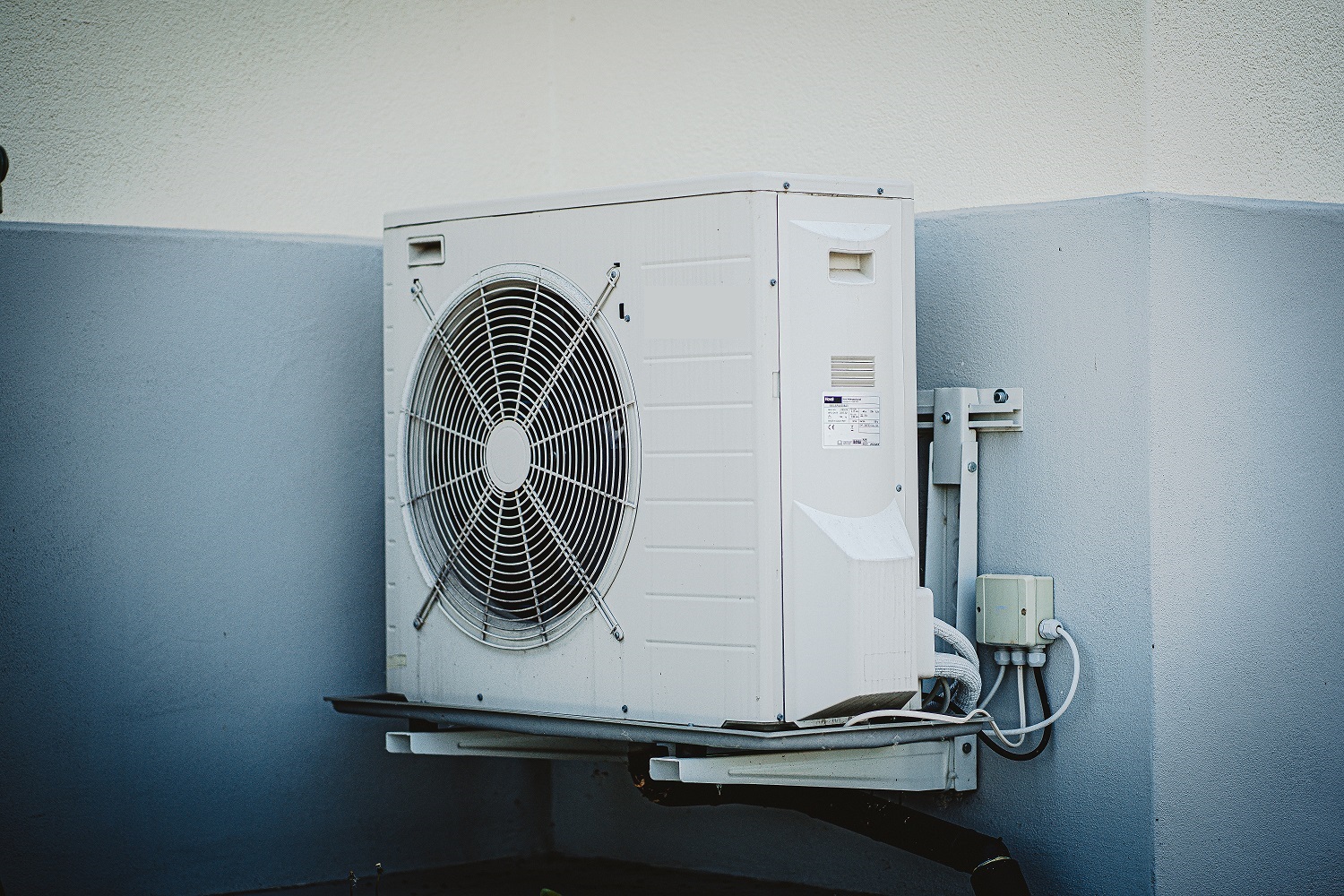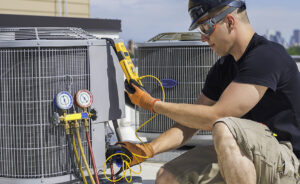In the dog days of summer, there’s nowhere a dog—or person—would rather be than in front of the air conditioner, enjoying a pleasant breeze instead of the sweltering heat outside. But in order to keep the heat from creeping in, especially as the heat in much of the world is creeping up, it’s important to have a reliable, functional, trustworthy air conditioner that will get you and your family through the hottest of days.
Buying an air conditioner can be daunting, especially with so many brands, features and specifications to choose from. We’ve researched the best air conditioning brands to help inform your decision and narrowed down the many choices to a top 10 list based on factors like price, efficiency, warranty and consumer ratings.
Note: The brands on this list work with authorized dealers and installers, so make sure to work with a professional who is familiar with the product.
How We Selected the Best Air Conditioning Brands
We developed our list of the best air conditioning brands by first identifying competitors that met basic criteria, such as offering professional installation, a 2.5-ton AC unit (which is the approximate size installed in most 1,400 to 1,800 square foot homes) and standard features that most homeowners look for. We reviewed the 19 most widely available companies from that list and scored them all based on 24 different attributes. We further pared our list down to the top 10 companies.
Our ratings take into account factors like pricing, availability of installation, customer experience, central AC features, central AC specs and customer resources available. All ratings are determined solely by our editorial team.
Why you can trust Forbes Home: The Forbes Home team is committed to bringing you independent, unbiased ratings and information. We use data and expert advice to inform all of our content. Plus, our advisory board of licensed professionals fact-checks and reviews our content for accuracy and relevancy.
The 10 Best Air Conditioner Brands of 2023
How to Determine Which Air Conditioning Brand Is Best for You
Depending on your needs, you should consider a few key factors while choosing among the best air conditioning brands and models.
Total Cost
Air conditioning systems can be costly, and many factors affect the final price tag. A good installation contractor or brand representative should walk you through each point in detail and be able to offer a reasonable estimate for your location.
Some of the cost-affecting variables include: house size, cooling capacity, how much of the house you want to cool, insulation quality and whether or not you have an existing AC system in place. Unit-wise, things like efficiency rating, extra features and how many BTUs you need can all have an impact on the final cost.
Location and upkeep may also result in higher upfront and long-term costs, especially if you live in a hotter region where air conditioning units need to be more durable and require frequent maintenance in order to stay functional. Places with cooler climates, where AC is used only seasonally or rarely, can expect lower price tags.
Finally, always take into account the long-term cost vs. savings of the AC unit on your energy bills. Though an energy-efficient air conditioner may seem like it costs an egregious amount upfront, once you crunch the numbers, you may realize that it will pay for itself within a few years of bills—a fair trade-off.
Extra Features
An air conditioning system with a lot of extra features is inevitably going to cost more. High-priced units often come with the bells and whistles attached, so it’s important to read the fine print to make sure you actually need or want everything that you’re paying for. While having a highly energy-efficient unit is ideal, you may not want it to also come with full internet capability and an app for your phone.
These qualifications always pay for good warranties, customer service and inexpensive energy-saving features whenever possible. Many basic AC models come with solid options in all three categories, so make sure to completely explore your choices—flashy and modest alike—before settling on a final decision.
Warranty
A hefty, long-term investment like an air conditioning system should always come with a warranty. Try to find a warranty offer that matches your needs and takes into account your location, especially the frequency with which you’ll be using your AC (remember, an air conditioner can break even when you’re not using it). Both workmanship warranties and manufacturing warranties can help ensure you’re protected from any problems caused by incorrect installation or model defects.
In general, cheaper models can also come with weaker warranties. This isn’t always true, but though it may be painful to cough up for an expensive system, it may also offer you better protection from expensive-to-fix problems in the long run.
Customer Service
Good customer service makes a world of difference in any area of business, not just HVAC. But if you live in an area where having good AC is crucial to well-being and survival, it’s important that you’re able to get reliable help whenever you need it. Carefully read reviews when researching brands, ask for estimates from multiple companies, and don’t be afraid to call directly if you have any concerns, questions or just want to see how a company handles customer support. Do the same for any installation contractors especially if they’re not employed directly by the manufacturer.
If something doesn’t seem quite right, whether it’s a lack of transparency over warranty filing processes or an inexperienced technician, don’t be afraid to continue your search elsewhere. Quick, efficient customer service could make a huge difference in your future quality of life.
Energy Efficiency
An air conditioner needs to be energy efficient and there are two rating systems to help you determine the quality of said efficiency: SEER and EnergyStar.
What Is SEER?
The Seasonal Energy Efficiency Ratio, or SEER, is a performance rating system designed to measure the energy efficiency—specifically the cooling performance—of air conditioners. The rating is determined by calculating the total cooling amount needed for a season, then dividing it by how much energy was used to provide said cooling. A good SEER rating is considered to be 14 or higher, and units rated above 20 are particularly energy efficient.
Federal law currently states that central ACs must have a minimum SEER rating of 14, though some states (typically in the hotter, more southern United States) have a minimum of 15 as of 2023.
What Is EnergyStar?
Energy Star is a certification that the air conditioner meets the energy efficiency guidelines issued by the U.S. Environmental Protection Agency. An Energy Star unit must therefore have a SEER rating of 14.5 or higher. By using an Energy Star-certified system, consumers can be certain that they are saving money and helping to protect the environment in the long term.
How Long Does an Air Conditioning System Last?
An air conditioning system will last around 15 to 20 years, as long as it is regularly maintained and serviced by a professional. Such inspections should occur at least once a year or more frequently if you use it a lot—particularly at the end and beginning of summer since you do not want your AC to break on you during the hottest months of the year.
Other factors can also affect the lifespan of your AC system. Always try to keep the unit, especially any part housed outdoors, clear of debris. A build-up of dirt can cause the hardware to wear down over time. An improper installation, whether that means a poorly sized unit or incorrect service, can cause your AC unit to stop working sooner than normal. Similar things can occur if you renovate or add to your house without modifying your AC system to meet the cooling requirements of the new space.
Finally, regardless of the regularity of maintenance, if you use your AC every day it will shorten the unit’s lifespan due to wear and tear.
Central Air Cost and Ways to Save
Running a central air system is expensive: there’s no way around it. The energy bills associated with having air conditioning can cause even the coolest homeowner to start getting sweaty. Forbes Home has compiled a list of ways to help you reduce your AC bill, no matter where you live. Here are a few, though not all, of the tips that you could try:
- Avoid cooking inside: Baking a cake or preparing a huge feast will cause your house to heat up fast. Try to cook outside or during cooler times of day, stock up on ingredients and pre-prepped staples, and prepare refreshing dishes like salads and cold soups.
- Set your AC thermostat higher: While it’s tempting to keep your home at a chilly 65 degrees Fahrenheit, especially if it’s hitting triple digits outside, raising your thermostat even a few degrees means that your AC unit will work smarter, not harder to keep your house cool—and save you money in the process.
- Close up your house: When it starts getting hot out, shut your curtains, windows and doors to stop the sun from turning your house into its own little oven. If you have a room that’s not connected to the AC, make sure that heat is not escaping from this area into other parts of the house.
Methodology
To determine the best air conditioning brands ranking, the Forbes Home editorial team analyzed 19 companies, with each company’s rating determined by evaluating a variety of metrics, including:
Pricing (15%)
When ranking for the pricing category, we considered the price of a standard efficiency 2.5-ton central AC unit and matching evaporator coil for each company. The lower the price, the higher the score.
Installation Availability (14%)
Availability of installation from AireServ, Sears, Home Depot and Lowes accounted for 14% of each company’s score.
Customer Experience (23%)
We rated each company on its BBB grade, BBB accreditation, ratio of complaints to reviews on the BBB, Trustpilot rating and number of Trustpilot reviews to come up with the customer experience score.
Consumer Reports (2%)
A small percentage was given to each company based on its Consumer Reports rating for predicted reliability and owner satisfaction.
Central AC Features (8%)
Features that help set some AC units apart from others including, smart thermostat compatibility, remote access, cooling stages and humidity control accounted for 8% of each company’s total score.
Central AC Specs (33%)
The specs of each AC unit including, the number of central AC models available, maximum SEER rating, average noise, parts warranty and compressor warranty were 33% of each company’s total score.
Resources Available (2%)
A small percentage was given to each company based on the resources available to customers including warranty information and a user manual.
Other Editorial Judgment Points (3%)
The editorial team looks deeper into categories like excess complaints, add-on options and other miscellaneous factors that set a company above the competition.
Tex taken from: https://www.forbes.com






